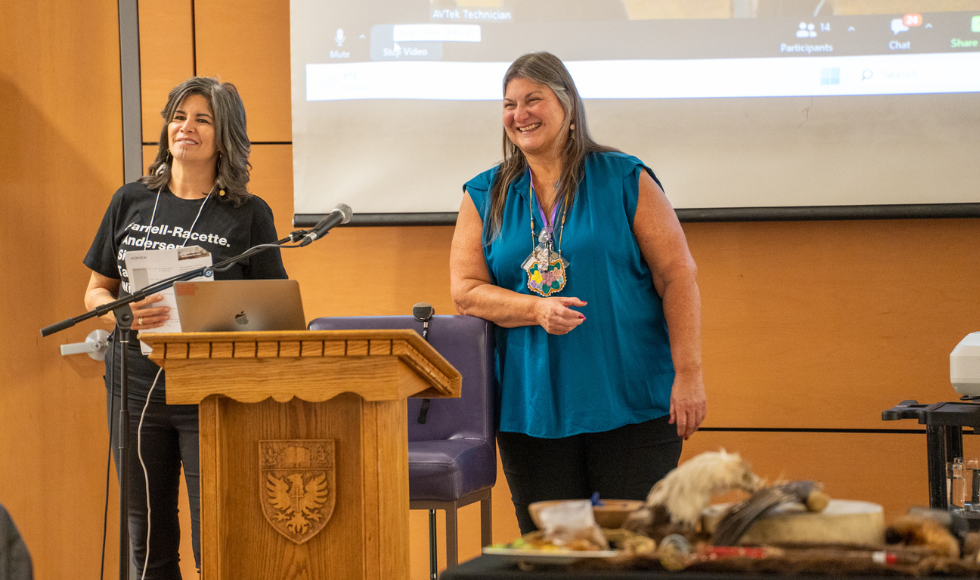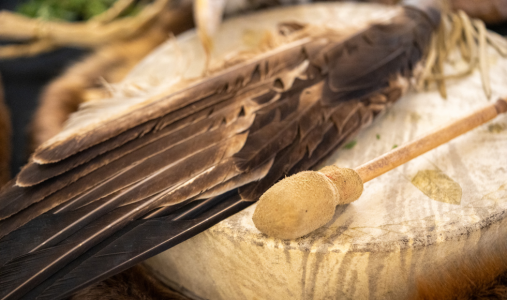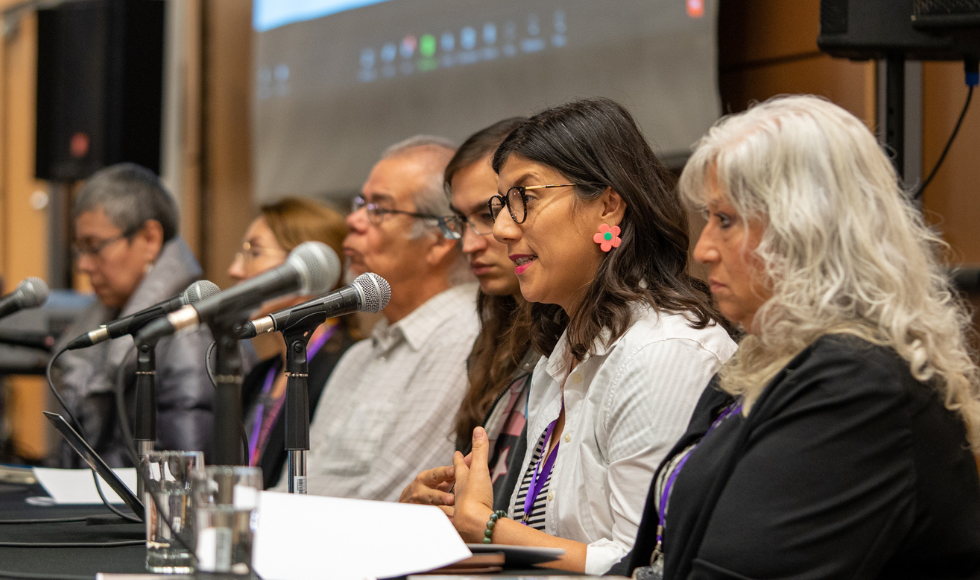McMaster Indigenous Research Day highlights important scholarship

MIRI director Savage Bear and Professor and keynote speaker Bonnie Freeman share the stage at the second annual McMaster Indigenous Research Day. (Photos by Christian Braun and Abdo Habbani, McMaster Student Success Centre)
BY Chris Pickles, Faculty of Social Sciences
November 14, 2023
Opening the second annual McMaster Indigenous Research Day, Elder Myeengun Henry had an important message for the gathered audience.
“Indigenous people are going to play an important role in creating a more just and equitable world,” Henry said. “The world needs Indigenous knowledge more than ever.”

The research day, co-hosted by the McMaster Indigenous Research Institute (MIRI), the Indigenous Health Learning Lodge, the Indigenous Studies Department, Indigenous Student Services, the FEAST Centre for Indigenous STBBI Research, University Advancement, and the Indigenous Health Movement, brought together scholars from across campus to showcase Indigenous research.
Keynote speaker Bonnie Freeman, an associate professor of Social Work with a joint appointment to Indigenous Studies, is also the 2023 recipient of the Indigenous Scholar in Community Fellowship. Freeman shared her experiences of the Two Row on the Grand Paddle.
Eighteen other McMaster scholars also shared their research, on topics that included water sovereignty on Six Nations and using language as medicine.

The day was especially meaningful for undergraduate students, including Ethan Michalenko, Hannah Butterworth and Makasa Looking Horse, giving them not only a platform to present their research, but also a forum to hear and learn from other Indigenous scholars.
“It means a lot to me to present my research and the research project that I’m working on, the Ohneganos water research project,” Looking Horse said.
“It’s really important that we can work together and share our networks and let each other know what we’re doing within our communities.”
Here is a full list of the presentations
- Kurtis Commanda, Dr. Ivona Kučerová, Owennatakha, Lynette Printup: Tehatiwennathe’tanyons They Shine Light on the Languages
- Carrie McMullin: An Environmental Scan of Indigenous-Informed Teaching Practices at McMaster University: Some Results and Recommendations for Educators
- Lori Davis Hill: Journey to Language as Medicine
- Bernice Downey: Whose Knowledge – Who’s Translation? The Need to Address the Dissonance between Western Models of Knowledge Translation and the Sharing of Gikendaasowin – Indigenous knowledge
- Vanessa Watts, Amber Dean: Who Gets What?: Archival and Community-Engaged Research in an Era of Reconcilation
- Patricia Farrugia, Matt Bolis: Needs Assessment: Understanding the Experience of Marginalized Populations – Focus on Indigenous Populations: A Survey of Patients Attending McMaster Fracture Clinic
- Hannah Butterworth: Community Driven Physical Activity Strategies for the Prevention of Dementia in First Nations Communities in Canada: A Scoping Review
- Ethan Michalenko: AI-OSPE: An Artificial Intelligence Software for Grading Anatomy Examinations
- Bonnie Freeman: The Kaswenta: Deepening Our Understanding of the Three White Beads Between the Purple Rows
- Jill Rogers: Fighting to Belong to Indigenous Communities: A Systematic Literature Review of Lateral Violence within Indigenous Communities
- Hannah Thomas: Cypress Hills Starvation Policy
- Kaeliana Smoke, Emily Anson: Mapping the Peacemaker’s Journey with Elder Norma Jacobs
- Makasa Looking Horse: Ohneganos Ohnegahdę:gyo: Traditional Ecological Knowledge, Training, and Co-creation of Mixed-Method Tools for Water Stewardship


